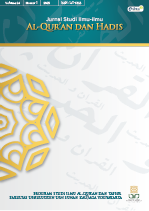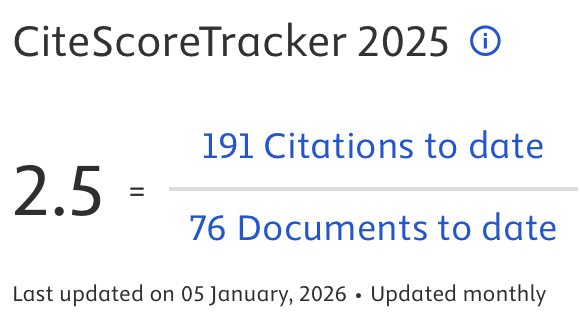Gender Equality within Family in Islamic Perspective: Insights from The Hadiths of Ummul Mukminin
DOI:
https://doi.org/10.14421/qh.v25i1.5260Keywords:
Gender Equality, Islam, Hadith, Family, The Mothers of BelieversAbstract
The concept of gender equality is crucial in reinforcing societal foundations and addressing issues of injustice. This study emphasizes the importance of understanding gender equality within the context of families, recognized as one of society'smost influential institutions. By exploring gender dynamics within the family, this research draws on the Hadith, which encapsulates historical records and narratives from the Prophet Muhammad's life in a patriarchal Arab society. Despite societal norms, the Prophet’s Hadith texts, driven by principles of equality and justice, advocate for equal relationships between men and women, sparking considerable debate and protest from his contemporaries. The significance of Hadith texts from Ummul Mukminin (the Mothers of the Believers) in discussing gender relations within the family lies in their potential to serve as a reference source. Utilizing content analysis as a methodology, this research provides a comprehensive examination of relevant Hadiths and their implications for modern gender equality within the family. The findings highlight the Prophet’s dedication to creating a model of marital relations based on mutual respect, compassion, and equality. The study positions these texts as guides for families, helping them reinforce their functions and internalize equality values, contributing to the formation of a maslahah family—a family governed by principles prioritizing societal well-being. Abstract viewed: 876 times
|
Abstract viewed: 876 times
|
 PDF downloaded = 645 times
PDF downloaded = 645 times
References
Abou el-Fadl, Khaled M. Atas Nama Tuhan; Dari Fikih Otoriter Ke Fikif Otoritatif. Jakarta: Serambi Ilmu Semesta, 2004.
Abu Dawud, Sulayman b. al-Ashʿath b. Ishaq al-Azdi al-Sijistani. Sahih Sunan Abi Dawud/Taṣhih Muhammad Nasir al-Din al-Albani. Riyadh: Maktab al-Tarbiyah al-ʻArabī li-Duwal al-Khalij, 1989.
Afidah, Ida. “Promoting Gender Equality and Empowerment: A Qur’nic and Hadith Perspective on Women’s Roles in Islam.” Diroyah: Jurnal Studi Ilmu Hadith 7, no. 2 (2023): 252–70.
Ahmed, Leila. Women and Gender in Islam: Historical Roots of a Modern Debate. Veritas Paperbacks, 2021.
Ālūsī, Maḥmūd Syukri Al. Bulūg Al-‘Arab Fī Ma’Rifat Aḥwāl al-‘Arab, n.d.
Anas, Malik bin. Muwatha Imam Malik. Al-Muassasah al-Risalah, 1998.
‘Asqalanī, Aḥmad bin ‘Alī Ibn Ḥajar Al. Al-Iṣābah Fī Tamyīz al-Sahabah. Beirut: Dār al-Kitab al-‘Arabi, n.d.
———. Fathul Bari Sharh Shahih Bukhari. Riyadh: Dar al-Tibah, 2005.
Athir, Ibnu, and Izz al-Din. “Usd Al-GhabafiMa’rifat al-Sahaba.” Cairo 62 (1970).
Bukhārī, Muḥammad bin Ismā’īl bin Ibrāhīm Abū ‘Abd Allāh. Ṣaḥīḥ Al-Bukhārī. Dar wa Mathabi’ al-Sya’b, n.d.
Connell, Raewyn. Confronting Equality: Gender, Knowledge and Global Change. Routledge, 2020.
Darimy, Abu Muhammad Abdullah bin Abd Rahman bin Fadhl bin Bahram al-. Sunan al-Darimi, Dar al-Mughni li al-Nasyr wa al-Tauzi’, 1420 H.
David, Miriam E. Personal and Political: Feminisms, Sociology, and Family Lives. Stoke-on-Trent: Trentham Books, 2003.
Dzahabi, Muhammad Husein Al. Al-Kasyif Fi Ma’rifati Man Lahu Riwayah Fi Kutub al-Sittah. Beirut: Dar al-Kutub al-Ilmiyah, n.d.
Etaugh, Claire A, and Judith S Bridges. Women’s Lives: A Psychological Exploration. Routledge, 2023.
Fakih, Mansour. Analisis Gender Dan Transformasi Sosial. Yogyakarta: Pustaka Pelajar, 2001.
Griffin, Rosari. Education in the Muslim World: Different Perspectives. Oxford: Symposium Books Ltd, 2006.
Ḥanbal, Aḥmad Ibn. Al-Musnad al-Imām Aḥmad Ibn-Ḥanbal. Beirut: Dar al Fikr, n.d.
Hisyam, Abū Muḥammad ‘Abd al-Malik bin. Al-Sīrah an-Nabawiyyah Li Ibni Hisyām. Beirut: Dār al-Kutub al-‘Ilmiyah, 2009.
Irsad, Muhammad, Abdul Mustaqim, and Saifuddin Zuhri Qudsy. “Paradigm Shifts in Gender Narratives of Tafsīr Al-Ibrīz through Oral Exegesis on Youtube.” Jurnal Studi Ilmu-Ilmu Al-Qur’an Dan Hadis 25, no. 1 (May 14, 2024): 141–60. https://doi.org/10.14421/qh.v25i1.5416.
Istiqlaliyah, Umniyatul. “Peran Dan Pengaruh Aisyah Dalam Bidang Hadis.” Dirosat: Jurnal of Islamic Studies 1, no. 1 (2016): 41–51.
Kodir, Abdul. Qira’ah Mubadalah: Tafsir Progresif Untuk Keadilan Gender Islam. Yogyakarta: IRCiSoD, 2019.
Labibah, Umniyatul, Imam Taufiq, and Moh Yasir Alimi. “Living Qur’an of Pesantren Women: A Manifestation of QS. An-Nisa 34 in A Woman Leadership Role of Nyai Munjidah Wahab.” Jurnal Studi Ilmu-Ilmu Al-Qur’an Dan Hadis 23, no. 1 (January 31, 2022): 89–110. https://doi.org/10.14421/qh.2022.2301-05.
Madani, Syekh Muhammad bin Ishaq bin Yasar al-Mutholib al. Sirah Nabawiyah. Beirut: Dar al-Kutub al-Ilmiyah, 2004.
Matswah, Akrimi. “Reinterpretasi Ayat-Ayat Tentang Relasi Gender Dalam Keluarga.” SUHUF 7, no. 2 (2014): 303-328.
Mernissi, Fatima. He Forgotten Queens of Islam. Cambridge: Polity Press, 1993.
Mitamimah, Aih. “Kesetaraan Kedudukan Perempuan Dan Laki-Laki Dalam Perspektif Hadis.” Jurnal Riset Agama 1, no. 1 (2021): 29–44. https://doi.org/10.15575/jra.v1i1.14254.
Muslim, Ausain. Sahih Muslim. Dar al-Tayyibah, 2006.
Nadawi, Sulaiman Al. ‘Aishah The True Beauty. Ghozi M. Jakarta: Pena Pundi Aksara, 2007.
Nadia, Zunly. Perempuan Dalam Periwayatan Hadis: Antara Otoristas Dan Kepentingan. Yogyakarta: Bildung, 2023.
Nasa’I, Abi Abd Rahman Ahmad bin Syu’aib Al. Sunan Al-Nasa’i. Kairo: Jam’iyyah al-Mikbar al-Islami, 1421.
Quzwaini, bu Abdullah Muhammad bin Yazid bin Abdullah bin Majah Al. Sunan Ibnu Maja, 2004.
Rahman, Andi. “Penggunaan Metode Content Analysis dalam Penelitian Hadis.” Journal of Qur’an and Hadith Studies 3, no. 1 (June 25, 2014): 101–17. https://doi.org/10.15408/quhas.v3i1.1165.
Sa’ad, Ibnu. Al-Ṭabaqāt al-Kubrā. Beirut: Dār al-Ṣādir, n.d.
Suyuti, Abd Al-Rahman ibn Abi Bakar jalal al-Din Al. Al-Durr al-Manthur Fi al-Ta’wil Bi al-Ma’thur. Maktabah Syamilah versi., 2011.
Ṭahmāz, ‘Abd al-Ḥamīd Maḥmūd. Al-Sayyidah ‘Āishah: Umm al-Mu’Minīn Wa ‘Ālimah Nisā’ al-Islām. Damaskus: Dār al-Qalam, 1994.
Tirmiżī, Muḥammad bin ‘Īsā ibn Saurah. Al-Jāmi’ al-Ṣaḥīḥ Wa Huwa Sunan al-Tirmiżī. Beirut: Dār al-Fikr, 1408.
Umar, Nasaruddin. Argumen Kesetaraan Jender Perspektif Al-Qur’an. Jakarta: Paramadina, 1999.
Wadud, Amina. Qur’an and Woman: Rereading the Sacred Text from a Woman’s Perspective. Oxford: Oxford University Press, 1999.
Watt, W. Montgomery. Muhammad at Mecca. Oxford: At The Clarendon Press, 1953.
Werdiningsih, Wilis, and Ahmad Natsir. “Gender Equality and Equity with Mubadalah Concept and Its Implementation in Islamic Education.” ADDIN 14, no. 2 (2020): 305–28.
Wood, JT. “Endered Lives: Communication, Gender, and Culture.” World Journal of English Language 3 (1999): 2–22.
Downloads
Published
How to Cite
Issue
Section
License
Copyright (c) 2024 Zunly Nadia, Niswatin Faoziah

This work is licensed under a Creative Commons Attribution-NonCommercial-NoDerivatives 4.0 International License.
Publishing your paper with Jurnal Studi Ilmu-ilmu al-Qur'an dan Hadis means that the author or authors retain the copyright in the paper. Jurnal Studi Ilmu-ilmu al-Qur'an dan Hadis uses license CC-BY-NC-ND or an equivalent license as the optimal license for the publication, distribution, use, and reuse of scholarly works. This license permits anyone to copy and redistribute the material in any medium or format and must give appropriate credit, provide a link to the license, and indicate if changes were made. If you remix, translate, transform or build upon the material you may use it for private use only and not for distribution. Jurnal Studi Ilmu-ilmu al-Qur'an dan Hadis granted an exclusive non-commercial reuse license by the author(s), but the author(s) are able to put the paper onto a website, distribute it to colleagues, give it to students, use it in your thesis, etc, so long as the use is not directed at a commercial advantage or toward private monetary gain. The author(s) can reuse the figures and tables and other information contained in their paper published by Jurnal Studi Ilmu-ilmu al-Qur'an dan Hadis in future papers or work without having to ask anyone for permission, provided that the figures, tables, or other information that is included in the new paper or work properly references the published paper as the source of the figures, tables or other information, and the new paper or work is not direct at a private monetary gain or commercial advantage.
Jurnal Studi Ilmu-ilmu al-Qur'an dan Hadis journal Open Acces articles are distrubuted under the Creative Commons Attribution-NonCommercial-NoDerivatives 4.0 International (CC BY-NC-ND 4.0). Article can be read, copy and redistribute the material ini any medium or format under the following conditions:
Attribution — You must give appropriate credit, provide a link to the license, and indicate if changes were made. You may do so in any reasonable manner, but not in any way that suggests the licensor endorses you or your use.
NonCommercial — You may not use the material for commercial purposes.
NoDerivatives — If you remix, transform, or build upon the material, you may not distribute the modified material.










